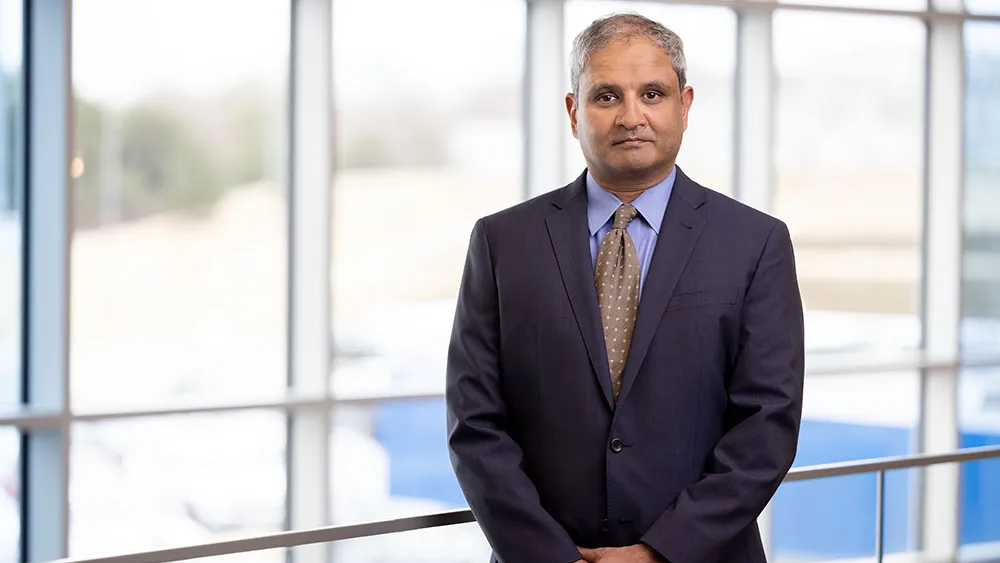




Today's Medicine
Methodist is a leader in the innovative stroke prevention procedure TCAR
Published: May 19, 2025

A Q&A with Rao Gutta, MD, a vascular surgeon with Methodist Physicians Clinic
Every 40 seconds, someone in the U.S. experiences a stroke, according to the Centers for Disease Control and Prevention (CDC). In 2022, over 165,000 people in the U.S. died from strokes. Meanwhile, strokes are a leading cause of serious long-term disability for survivors.
May is American Stroke Month, a time to shine a light on what we can all do to prevent strokes – and the importance of quick action in the event of a stroke.
What is a stroke? What are the signs and symptoms?
A stroke is when an individual suffers damage to the brain or spine from either a lack of blood flow to part of the brain or bleeding in the brain. The damage causes a loss of function.
Signs and symptoms of stroke include:
- Numbness or weakness in the arms or legs
- Facial drooping
- Trouble speaking
- Visual disturbances
- Sudden onset of balance issues or vertigo
- Confusion
What should you do if you or someone else is experiencing stroke symptoms?
If you’re concerned that you or someone else might be having a stroke, it’s imperative that you seek medical help immediately. If symptoms are mild and resolve in a minute or two, you should contact your primary care provider or go to an emergency room. If symptoms are significant, call 911 immediately.
It’s important to identify a stroke as quickly as possible because every minute counts. A patient has to be seen, evaluated and diagnosed with a stroke within 4 ½ hours of the onset of symptoms to be eligible for medication that has been shown to significantly improve outcomes. Ideally, a stroke is identified in under three hours. Even after 4 ½ hours, there may be treatment available that can improve outcomes.
What is the role of vascular surgery providers on a stroke care team?
Many strokes are caused by carotid artery disease – when a carotid artery in the neck is blocked or narrowed with plaque. Commonly, a piece of plaque breaks off from the artery and travels to the brain, cutting off blood supply and causing a stroke.
I specialize in stroke prevention with procedures that address carotid artery disease, including carotid endarterectomy (CEA), which removes plaque in the carotid arteries, and transfemoral artery stenting, which opens a blocked carotid artery. I also can perform transcarotid artery revascularization (TCAR), a procedure that offers many advantages for patients.
What is TCAR, and how can it help prevent a stroke?
TCAR is a less invasive procedure to treat carotid artery disease. It’s performed by making a small incision in the neck and placing a stent across the narrowing artery while blood flow is reversed. This is different than stents that are placed via an incision in the groin; those carry a higher risk of stroke from the procedure than TCAR. While blood flow is reversed, plaque particles are filtered from the blood, which also helps decrease the risk of stroke. The procedure takes about 45 minutes. Many times, patients are awake, as the procedure is done with local anesthesia and mild sedation. Patients stay overnight at the hospital, and about 95% go home within 24 hours.
How is Methodist a leader in TCAR procedures?
TCAR is a relatively new procedure, having been developed in 2012 and approved by the FDA in 2015. Methodist Health System was first in the region to offer TCAR in 2018. Individual outcomes by our providers are tracked by a national database, and our success rates are in the top percentile nationally.
What’s most important for people to know about strokes and stroke care?
I encourage you to have regular visits with your primary care provider to form a plan if you’re at risk for a stroke. This can include monitoring your blood pressure, improving your diet and being physically active.
Most importantly, anyone experiencing a possible stroke should act immediately. Even if symptoms are vague or minor, let your primary care provider know as soon as possible. They can help you decide whether further testing or care is necessary.
Rao Gutta, MD, a vascular surgeon with Methodist Physicians Clinic, especially enjoys the variety of patients he sees and building long-term relationships with them. To schedule an appointment with Dr. Gutta or another Methodist provider, visit bestcare.org/providers. To learn more about the Methodist Stroke Program, visit bestcare.org/specialties/stroke-program.

